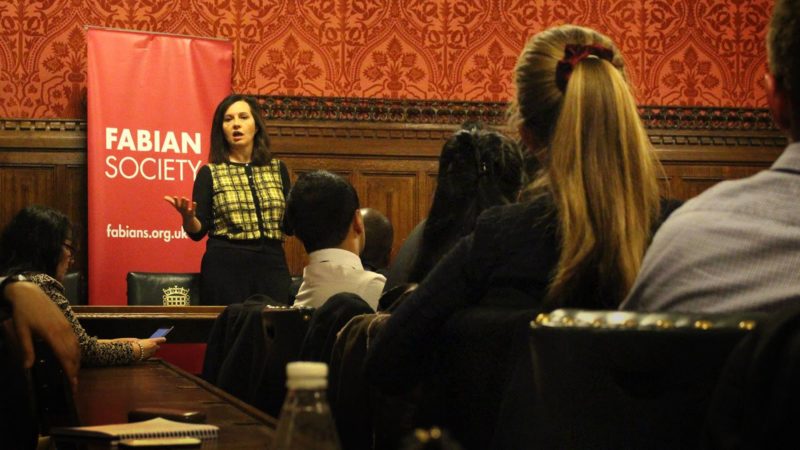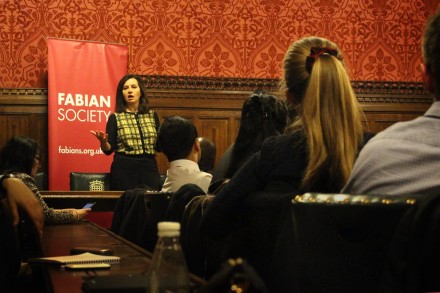

A few weeks ago the Young Fabians launched their Women in Leadership series which highlights women’s significant under-representation in positions of leadership across a range of industries and seeks to identify constructive ways to change this status quo.
Women’s representation in politics is poor, with a celebrated although shockingly low 29 per cent of female MPs sitting in Parliament. The Labour Party has put in place measures to facilitate improved female representation in Parliament, such as all-women shortlists. With a 50:50 shadow cabinet and a Parliamentary Labour Party (PLP) comprising 43 per cent female MPs, the Labour Party is seemingly heading in the right direction towards gender equality in Westminster.
Or is it? We have a 50:50 shadow cabinet, yet female MPs do not hold the senior positions within it. Furthermore, last summer saw the selection of three men in the internal elections of Labour Leader, Deputy Leader and the London Mayoral candidate. How did the party of equality and diversity select three men and not one of the equally experienced, remarkable female candidates?
Moreover, outside the Westminster bubble, women only make up 16 per cent of Labour council leaders and 30 per cent of Labour CLP Chairs. Surely, as the Labour Party we should be holding the beacon of gender equality in leadership.
Parliament is not the only place where leadership roles are disproportionately held by men. Over the course of the century gender roles and responsibilities have changed dramatically. We are routinely seeing women balancing work and family life and breaking into male-dominated industries such as technology, finance and engineering. Yet this increase in female representation isn’t reflected by those who sit at the top of the industry structures; after all research has shown 88 per cent of boardroom seats are held by men and 92 per cent of CEOs worldwide are male.
We live in a society where girls do as well and often better in school than boys; where more women go to university; and where equal opportunity acts have made it harder to discriminate against candidates on the basis of gender. Women are no longer forced by law or social etiquette to choose between family life and a career.
Several reasons have been put forward for this lack of female leadership within society: some intrinsic, some external, which we will be exploring in this series. It has been argued that women lack the confidence or self-belief to head for the top. Others argue the male-dominated leadership culture of the boardroom deter women from joining in. Some would claim that women fail to sufficiently support each other, often pulling the ladder up from under them when they reach the top, as Margaret Thatcher was accused of doing.
Is it the fact women are socialised to take on a caring role, to compromise and to collaborate that makes them veer away from leadership? If it is, then I would argue these are qualities that a boardroom would greatly benefit from. Is it the fact that women are wary of putting themselves in the spotlight for fear of exploitation, intimidation and sexist slurs? I imagine that is part of it for many women. We’ve all seen the horrendous online abuse directed at Jess Phillips, Liz Kendall and Stella Creasy to name but a few. Similarly, we often see women, such as Hilary Clinton, held to a higher moral standard than men. In a society where women and men are considered to be created equal, there continues to be a disproportionate amount of abuse aimed at women based on gender.
Women have the capacity to be leaders just as men do. We don’t want an easy ride, a leg-up or a free pass. But what we do want is an opportunity to succeed based on our own merit; based on the fact that women possess the experience, the skills and the ability to take the lead. I would argue that providing that opportunity relies on equalling out the playing field.
We need to be moving away from the assumption that women will always be at a biological disadvantage when it comes to having children; from the idea that women must make a choice as to whether their family or their ambition is more important to them; from believing the only way to succeed is by behaving as men do.
Instead, we should be focusing on how we change the culture of society. We should be acknowledging the fact that children are created by women and men, a joint venture that should result in joint responsibility. There needs to be increased access to flexible working for women and men to enable them to continue their careers and bring up their children. We should be fighting for access to affordable childcare so that one parent is not financially de-incentivised from returning to work. We should be highlighting sexism in all its shapes and forms: be it direct misogynist attacks via social media or subtle criticisms based on women’s appearance or ‘femininity’.
Ultimately, we need to be accepting, and celebrate our gender differences and what we as women and as men can bring to the table. This means bringing men into the debate, highlighting the barriers we face and sharing responsibility for making the workplace, our parliament, and society as a whole a place where a female leader isn’t a celebrated exception to the rule, but the norm.
Ria Bernard is vice-chair of the Young Fabians
The next event in the Women in Leadership Series will focus on Women in Law in April #womeninleadership




More from LabourList
Economic stability for an uncertain world: Spring Statement 2026
‘Biggest investment programme in our history’: Welsh Labour commit to NHS revamp if successful in Senedd elections
James Frith and Sharon Hodgson promoted as government ministers